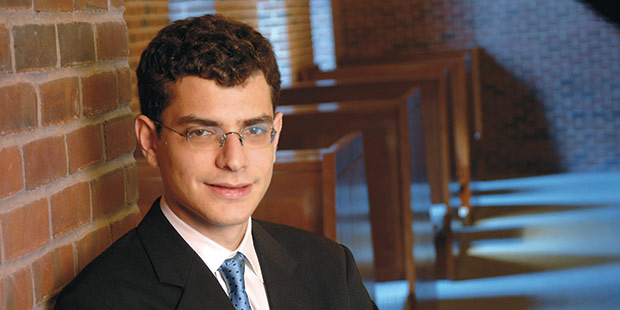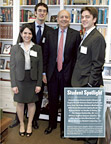All the Presidente’s Men
Before entering law school, Richard Brand broke a story with international political repercussions.
Printer Friendly VersionIn his pre-law days as a reporter for The Miami Herald, Richard Brand ’07 set out to write a positive “hometown hero” piece about the meteoric rise of Smartmatic, a local software startup run by two Venezuelans. Smartmatic had then just beaten out several more experienced vendors to land a $91 million contract with the Venezuelan government to supply voting machines for the upcoming recall referendum of President Hugo Chávez. Brand figured out something was amiss when he arrived at a tiny office in Boca Raton where a handwritten note taped to the door read “Please Knock.” While Smartmatic represented itself as a U.S.-based company, clearly its operations were located elsewhere.
Brand went to work: tracking down Smartmatic executives in Venezuela, pulling documents written in Spanish (he’s bilingual) buried in the bureaucracy of Venezuela’s commercial registries, and spending hours in the squat 1970s-era building that houses the National Electoral Council (CNE), sweettalking secretaries to gain access and cultivating sources. “There wasn’t one Deep Throat,” he says, as his sources included a number of businessmen, Venezuelan government officials and a former operative of Venezuela’s intelligence agency who would fly from Caracas to deliver information to Brand at a Coral Gables restaurant.
In May 2004 Brand broke his front-page story. Smartmatic, which operated mainly out of Caracas, not Florida, appeared to have had the inside track in obtaining the government contract. Smartmatic had partnered with Bizta, a tiny company founded by the same Venezuelan executives, which in the months prior to receiving the major contract had secretly sold 28 percent of its stock to the Chávez government. A pro- Chávez Science Ministry official sat on Bizta’s board of directors. Further, “Neither Smartmatic nor Bizta had ever performed an election,” says Brand.
After Brand revealed Venezuela’s investment in Bizta, the government divested its shares in the company. Chávez survived the August 2004 recall referendum amid accusations of election fraud by the opposition, and the story fell out of the U.S. news. Meanwhile Brand married a Cardozo law student, Samantha, moved to New York, and entered NYU.
Then in March 2005, flush with cash from its Venezuelan contracts, Smartmatic bought California-based Sequoia Voting Systems, a major U.S. e-voting manufacturer. “I was stunned to hear that a company with a controversial history and financial links to the Venezuelan government would be playing such a high-profile role in counting millions of U.S. votes without anybody looking into it first,” says Brand. In March 2006, he wrote an op-ed piece in the Miami Herald questioning whether Smartmatic’s purchase of Sequoia merited investigation: “Congress spent two weeks overreacting to news that Dubai Ports World would operate several American ports, but a better target for their hysteria would be the acquisition by Smartmatic International of Californiabased Sequoia Voting Systems, whose machines serve millions of U.S. voters.”
In May 2006, Brand met with State Department officials interested in a briefing on Smartmatic. Congresswoman Carolyn Maloney wrote a letter to then-Treasury Secretary John Snow, attaching Brand’s articles as exhibits. Shortly thereafter, the Committee on Foreign Investments in the United States (CFIUS), the FBI and the IRS reportedly opened investigations into Smartmatic. By December 2006, Smartmatic had announced it would sell Sequoia Voting Systems in response to the investigations, but denied improper links to the Chávez government. “Obviously Smartmatic was unable to convince federal investigators that its ownership of Sequoia posed no risk to the security of our elections,” says Brand. “The pending sale is an important step in building the confidence of Americans in the electoral process.”
Brand’s firsthand exploration into a matter vital to our democracy has enriched the discussion in many classes. “Having a journalistic, deep investigation into the facts brought into the law classroom is illuminating,” says Richard Pildes, Sudler Family Professor of Constitutional Law. Pildes is an expert in voter rights law who taught Brand in his course, Law and Democracy, which addresses some of the very issues Brand has reported on. “The skills he uses, the investigative mind-set—really digging and uncovering facts, figuring how to get access to information—can serve someone well in his role as lawyer.”
Samuel Issacharoff, Bonnie and Richard Reiss Professor of Constitutional Law, an expert on the electoral process, and Brand’s independent research adviser, says: “Until the Florida election, we tended to think that the machinery of the elections was relatively technical and unimportant. Richard figured out that there was the possibility of using the new technology of computerized voting as a means to assure a preexisting set of results…and that the government of Hugo Chávez was neck-deep in moving into this brave new world.”
As a young reporter, “senators, ambassadors and mayors take your calls, and now they don’t anymore,” Brand says, describing the “byline withdrawal” he has experienced moving from journalism to the relative anonymity of law school, and on to join Cravath, Swaine & Moore in their corporate department. “But,” he says, “if ever there was a law school with more things going on in election law, it’s NYU.”

